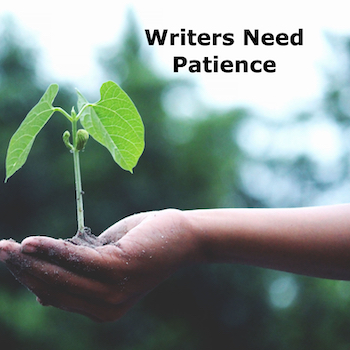 F. Scott Fitzgerald once wrote: “The test of a first-rate intelligence is the ability to hold two opposed ideas in mind at the same time, and still retain the ability to function.”
F. Scott Fitzgerald once wrote: “The test of a first-rate intelligence is the ability to hold two opposed ideas in mind at the same time, and still retain the ability to function.”
First-rate writers need to do something similar: sustaining patience and impatience. Being patiently impatient, if that’s possible.
Impatience motivates
Many writers are driven by a sense of urgency. We are eager to get our ideas out in the world, our books published, or our blog posts in the hands of those who need them. We want to share our messages, change people’s minds, perhaps even transform the world.
Impatience can spur you to write or take action. It gets you out of bed and back at work. It prompts you to stretch the boundaries of your comfort zone and learn.
But it’s not enough. The impatient writer, untempered by patience, quickly runs out of steam or reaches the limits of their abilities.
Patience keeps you on the right path
The writing path is usually long, with no fixed endpoint. Real change and growth take time.
With patience and luck, the apple orchard you plant and care for will produce more fruit than you can eat. The garden you design and tend will develop into its mature self. The same is true for your writing.

Your writing career may not yield a visible harvest right away.
Writers need patience to:
Revise their work to meet audience needs
Learn from editors (rather than railing at their suggestions)
Finish a book
Build a blog audience
Repeat and expand the message multiple times, from different angles
As you share your thoughts with the world, you may not see the progress or the impact you’re having. Patience and persistence pay off in the long run.
Hope feeds patience, and patience, hope.
The Fitzgerald quote at the top of this post comes from his essay “The Crack-Up.” After that famous observation, it continues as follows: “One should, for example, be able to see that things are hopeless and yet be determined to make them otherwise.”
You may feel that your task is hopeless, that no one is reading what you write or that your voice is too quiet to make a difference.
If you write about important issues, progress may seem invisible.
When a sense of hopelessness rears its head, return to your juggling act of patience and impatience.
Be impatient to make things better, to take action, to renew your efforts. Be patient in expecting tangible results.
Your words may contribute to a tipping point, your voice join others in a chorus that eventually overwhelms the noise. You’ll never know when that point is about to happen. Keep writing.
Related Content
Feeling Lazy? In a Rush? Lame Reasons to Short-cut the Process